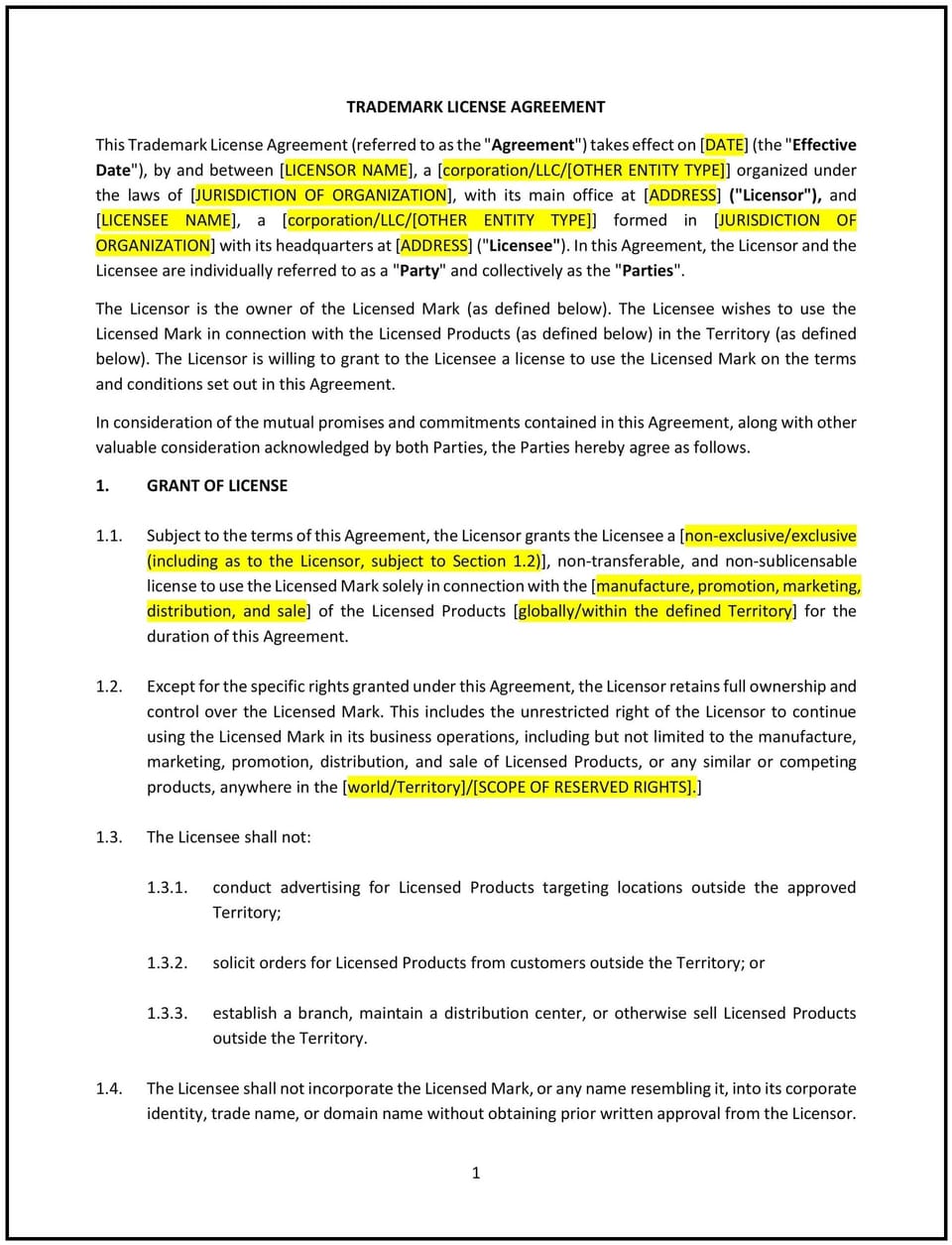Trademark License Agreement (Pro-Licensee) (Ohio): Free template

Trademark License Agreement (Pro-Licensee) (Ohio)
A Trademark License Agreement is a legal contract that grants a licensee the right to use a trademark owned by another party. For businesses in Ohio, this agreement is a valuable tool for expanding brand reach while ensuring compliance with the licensor’s requirements. Whether you’re licensing a logo, brand name, or slogan, a well-drafted agreement ensures both parties understand their rights and obligations.
In Ohio, industries like retail, healthcare, technology, and manufacturing often rely on trademark license agreements to collaborate with partners, distributors, or franchisees. For example, a Cincinnati-based retailer might license a popular brand to enhance its product offerings, or a tech startup could use a trademark to promote its services. A pro-licensee agreement prioritizes the licensee’s interests, ensuring they have the flexibility and protection needed to operate effectively.
To minimize the likelihood of conflicts and preserve the value of the trademark, it’s crucial to define usage rights, quality standards, and financial terms in clear and unambiguous language. Ohio’s Deceptive Trade Practices Act may also impact how trademarks are used and enforced, making compliance critical.
Tips for drafting and maintaining a Trademark License Agreement (Pro-Licensee) in Ohio
- Define the scope of the license: Clearly specify how the licensee can use the trademark. Include details such as geographic limitations, product categories, and exclusivity.
- Example: “The licensee is granted a non-exclusive license to use the trademark in connection with the sale of branded merchandise within the state of Ohio.”
- Set quality control standards: To protect the trademark’s reputation, include provisions requiring the licensee to maintain specific quality standards. This ensures the licensed products or services align with the licensor’s brand identity.
- Tip: Ensure these standards are realistic and enforceable to comply with state and federal trademark laws.
- Outline financial terms: Specify royalty rates, payment schedules, and any upfront fees. Ensure these terms are clear and realistic to avoid misunderstandings.
- Example: “The licensee agrees to pay a royalty of 5% of gross sales generated from the use of the trademark, payable quarterly.”
- Include termination clauses: Define conditions under which the agreement can be terminated, such as breach of terms, failure to meet sales targets, or expiration of the license period.
- Example: “This agreement may be terminated by the licensor if the licensee fails to make payments within 30 days of the due date.”
- Ensure compliance with state and federal laws: Trademarks are governed by both state and federal laws. Ensure your agreement complies with applicable trademark laws, including registration and usage requirements.
- Tip: If the trademark is federally registered, include the registration number in the agreement to strengthen enforceability.
- Address dispute resolution: Specify how disputes will be resolved, whether through negotiation, mediation, or arbitration. Indicate that Ohio law will govern the agreement to avoid jurisdictional issues.
- Example: “Any disputes arising under this agreement shall be resolved through arbitration in Columbus, Ohio, in accordance with Ohio law.”
- Keep the agreement updated: As your business grows or market conditions change, review and update the agreement to reflect new terms or circumstances. Regular updates ensure the agreement remains relevant and enforceable.
- Tip: Schedule an annual review to assess whether the agreement still meets both parties’ needs and complies with evolving regulations.
Frequently asked questions (FAQs)
Q: What should I include in my Trademark License Agreement (Pro-Licensee) in Ohio?
A: Your agreement should include the scope of the license, quality control standards, financial terms (royalties, fees), termination clauses, compliance with state and federal laws, and a process for resolving disputes. It’s also helpful to specify reporting and inspection rights for the licensor.
Q: How does Ohio law affect my Trademark License Agreement?
A: Ohio follows federal trademark laws but also enforces state-specific consumer protection regulations under the Deceptive Trade Practices Act. Ensure your contract complies with both state and federal requirements, particularly if the trademark is used across state lines or involves consumer-facing products.
Q: Can I negotiate the terms of a Trademark License Agreement?
A: Yes, the terms of a trademark license agreement are negotiable. A pro-licensee agreement focuses on protecting the licensee’s interests, so ensure the terms provide sufficient flexibility and clarity for your business operations.
Q: What happens if the licensee breaches the agreement?
A: If the licensee breaches the agreement, the licensor may have the right to terminate the license, seek damages, or enforce other remedies outlined in the contract. Including clear breach and termination clauses helps mitigate risks.
Q: How can I ensure my agreement protects my business in Ohio?
A: Consider Ohio’s business and trademark laws to customise the agreement to address potential risks relevant to your business. Regularly reviewing and updating the agreement as your business evolves is also essential.
This article contains general legal information and does not contain legal advice. Cobrief is not a law firm or a substitute for an attorney or law firm. The law is complex and changes often. For legal advice, please ask a lawyer.


